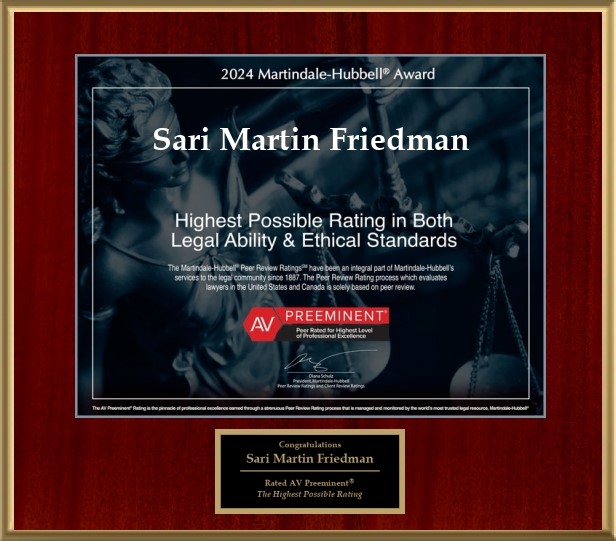White Plains Family Law Attorney
Friedman & Friedman PLLC, Attorneys at Law – Handling Your Most Sensitive Legal Issues
When it comes to managing family law and divorce cases in White Plains, NY, Friedman & Friedman PLLC, Attorneys at Law are well-known for bringing both professionalism and compassion.
At our family law firm in White Plains, no client is seen as anything but a unique individual with specific legal issues that need resolving. More than finding conclusions, however, our White Plains family lawyers look for amicable solutions that result in as little stress and “burned bridges” as possible.
In New York, most divorces will involve:
- Grounds for divorce
- Property & debt division
- Alimony
All of these concerns and more can be handled with care by Friedman & Friedman PLLC, Attorneys at Law. Come see for yourself why so many past clients love our White Plains family law attorneys.
Call (914) 873-4410 or reach out online today to discuss your case during an initial consultation with our family lawyers in White Plains.
Protecting Your Interests During Divorce in New York
Divorce is one of the most common issues addressed in family law. In New York, there are two primary types of divorce: uncontested and contested.
-
Uncontested Divorce: An uncontested divorce occurs when both spouses agree on all major issues, such as property division, child custody, and support. This type of divorce is generally quicker and less expensive. However, having a White Plains family lawyer review the agreement is still important to ensure fairness and compliance with the law.
-
Contested Divorce: A contested divorce happens when spouses cannot agree on one or more major issues. This often leads to court hearings, where a judge will make decisions regarding property division, alimony, custody, and other matters. A White Plains family law attorney can help represent you during this process, ensuring that your rights are protected throughout.
New York is a no-fault divorce state, which means you don’t need to prove fault, such as adultery or abuse, to obtain a divorce. However, in some cases, fault may be relevant when determining issues like spousal support or property division.
Taking Care of Your Children, First & Foremost
Since half of all marriages will end in divorce, statistically, it is not uncommon for couples to share children together when they decide to call it quits. Our White Plains family law attorneys at Friedman & Friedman PLLC, Attorneys at Law are well-versed in all legal concerns pertaining to children.
You can come to the law firm for help with:
- Child custody
- Child support
- Fathers’ rights matters
- Visitation schedules
In order to keep your children feeling happy, safe, and sound as your divorce progresses, our family lawyers in White Plains never press you into a decision that makes you uncomfortable. We genuinely want you to be able to sit and speak with your children about what is going on without necessarily divulging too many details about why you are divorcing. This will hopefully allow you to create or maintain a sense of togetherness that your children can appreciate, even as you and your spouse separate.
Supporting You in Property Division in New York
Property division is often one of the most contentious aspects of a divorce. In New York, the court follows the principle of equitable distribution when dividing marital property. This means that assets and debts acquired during the marriage are divided fairly but not necessarily equally. The goal is to ensure that both parties receive an appropriate share of the marital estate based on various factors.
When a couple divorces in New York, both separate property (assets owned by one spouse before the marriage) and marital property (assets acquired during the marriage) must be evaluated and divided. The court considers multiple factors when determining how marital property will be divided, including:
- The duration of the marriage
- The age and health of each spouse
- The income and earning potential of both spouses
- Contributions to the marriage
- The need for financial support
- Any agreements in place
A White Plains family law attorney can help ensure that all assets and debts are properly accounted for during the property division process. Whether it involves real estate, retirement accounts, business interests, or personal property, your lawyer will work to protect your financial interests and seek a fair division.
In some cases, negotiation or mediation may be the best approach to resolving property division matters, avoiding the need for a prolonged court battle. Your attorney will work to facilitate discussions and advocate for a fair outcome that aligns with your needs and goals.
Handling Spousal Support (Alimony) in New York Divorce Cases
Spousal support, also known as alimony, is financial assistance one spouse may be required to pay to the other after a divorce. In New York, spousal support can be awarded in a variety of situations, depending on factors such as the length of the marriage, the income and assets of both spouses, and the needs of the recipient spouse.
Spousal support can either be temporary or permanent. Temporary spousal support is typically awarded during the divorce proceedings and is intended to maintain the recipient spouse's standard of living until the divorce is finalized. Permanent spousal support, on the other hand, may be awarded after the divorce is complete, typically if the recipient spouse is unable to support themselves fully.
When determining spousal support in New York, the court considers a range of factors to ensure that the support is fair and reasonable for both parties. These factors include:
- The length of the marriage
- The income and earning capacity of both spouse
- The recipient spouse’s needs
- The paying spouse’s ability to pay
- The recipient spouse’s contributions to the marriage
- The recipient spouse’s future earning potential
- Standard of living during the marriage
A White Plains family law attorney can help you navigate the complexities of spousal support during your divorce. If you are seeking spousal support, your lawyer can assist in gathering the necessary evidence and advocating for the amount of support you need. Conversely, if you are facing a spousal support claim, your attorney can help ensure that the terms of any alimony order are fair and reasonable.
Connect with Trusted White Plains Family Lawyers Today
Are you feeling stressed about your divorce? Take a moment to realize that everyone who goes through a divorce has the same emotions, doubts, and questions. Contact Friedman & Friedman PLLC, Attorneys at Law to connect with family law attorneys in White Plains and further rest your nerves. Let our firm know what is wrong so they can tell you how to make it right.
Schedule Your Consultation Online – Get Started Now or Call (914) 873-4410 for Immediate Assistance










